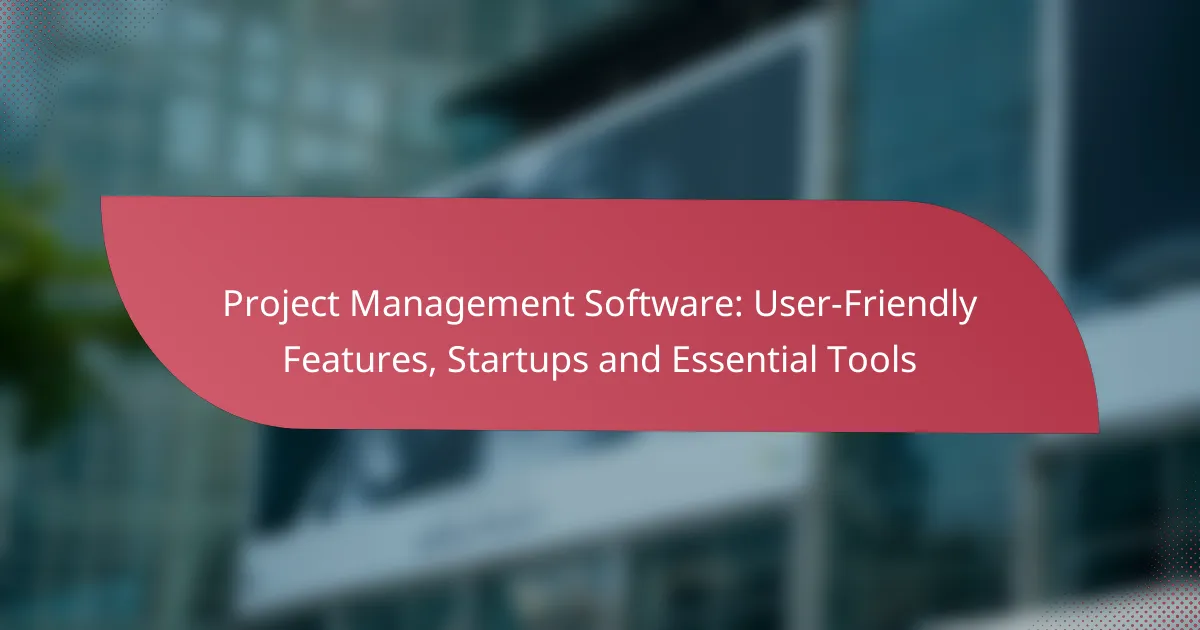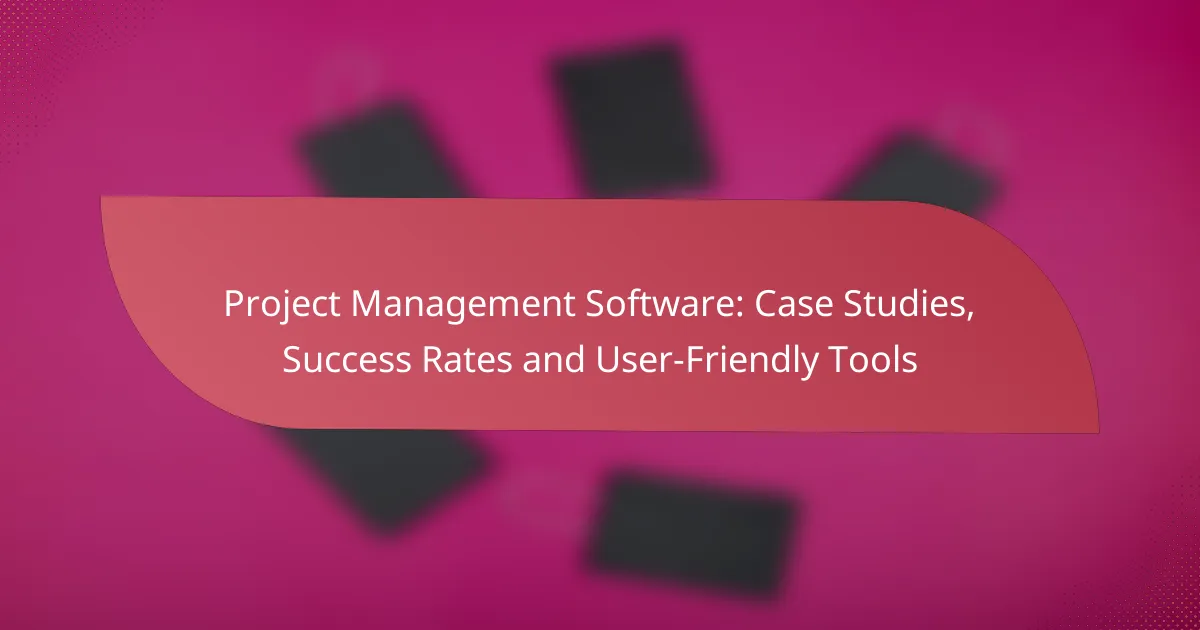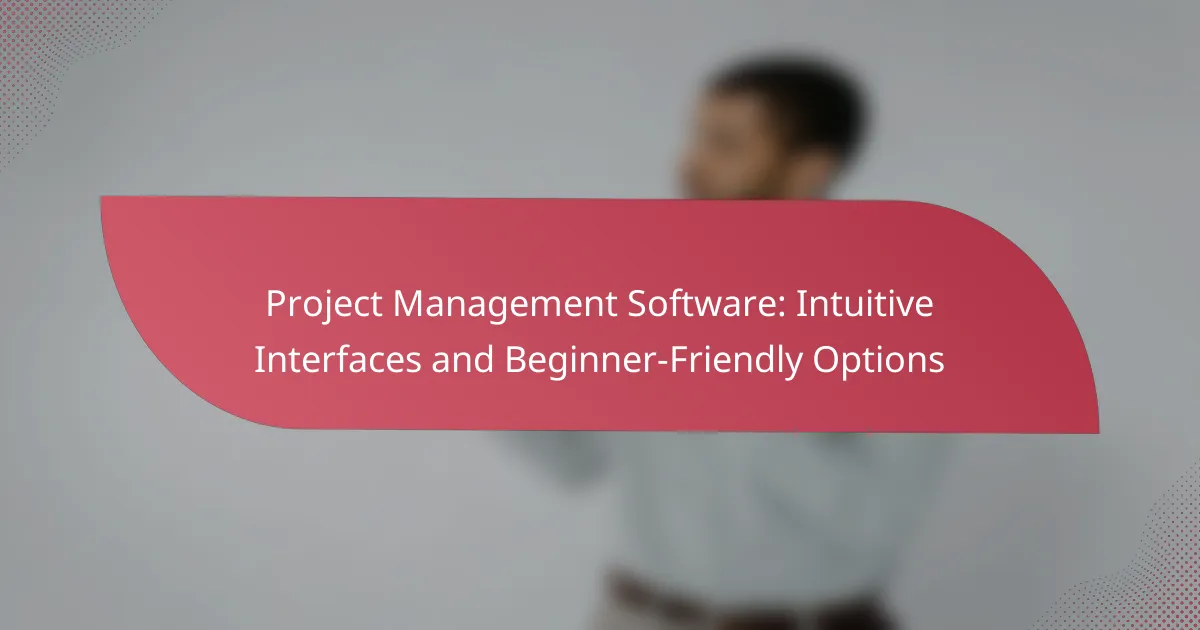In today’s fast-paced business environment, selecting the right project management software is essential for startups aiming to enhance collaboration and efficiency. User-friendly solutions offer intuitive interfaces, effective collaboration tools, and task automation, making them ideal for new businesses. By focusing on affordability and scalability, startups can choose software that aligns with their specific needs and budget constraints.
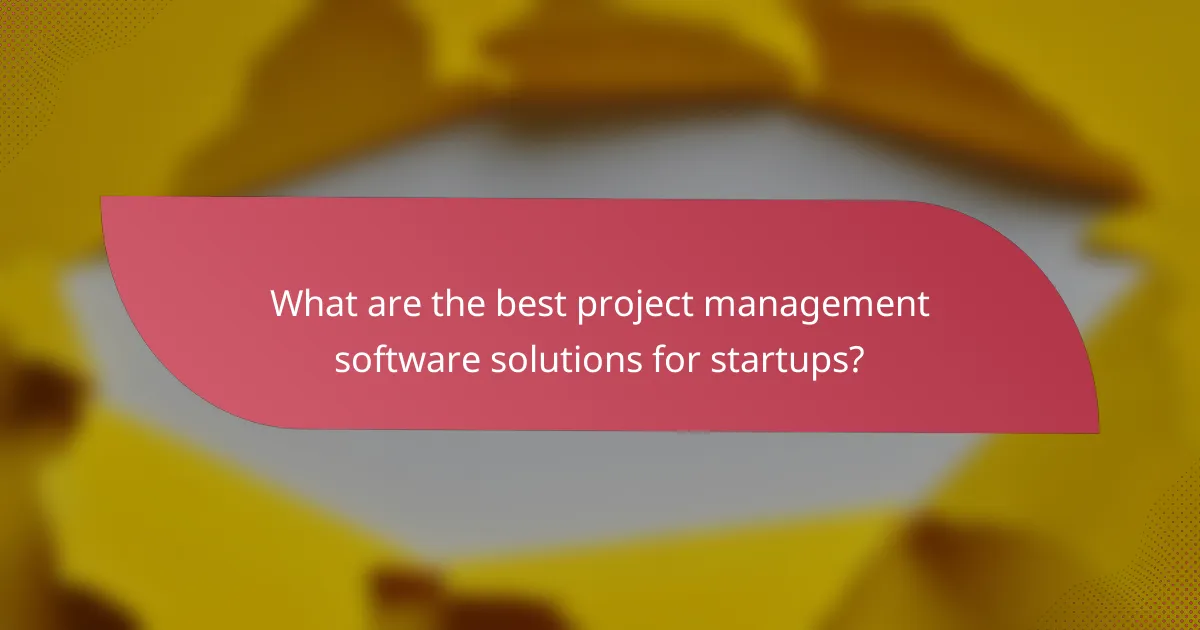
What are the best project management software solutions for startups?
The best project management software solutions for startups are user-friendly, affordable, and scalable. They help teams collaborate effectively, track progress, and manage resources efficiently, which is crucial for new businesses.
Trello
Trello is a visual project management tool that uses boards, lists, and cards to organize tasks. Its simplicity makes it ideal for startups looking to manage projects without a steep learning curve.
Users can create boards for different projects and add cards for tasks, which can be moved between lists as they progress. This flexibility allows teams to customize their workflow easily.
Asana
Asana is a robust project management platform that offers task assignments, timelines, and progress tracking. It is particularly useful for startups that need to manage multiple projects simultaneously.
With features like project templates and integration with other tools, Asana streamlines collaboration. Startups can benefit from its ability to set deadlines and track dependencies, ensuring that projects stay on schedule.
Monday.com
Monday.com is a highly customizable project management tool that allows teams to create workflows tailored to their specific needs. Its visual interface helps startups manage tasks and projects effectively.
Startups can utilize various templates and automation features to reduce manual work. The platform’s ability to integrate with other software enhances its functionality, making it a versatile choice for growing businesses.
ClickUp
ClickUp is an all-in-one project management solution that combines tasks, docs, goals, and chat in one platform. This makes it suitable for startups that want a comprehensive tool without needing multiple applications.
With features like time tracking, reminders, and customizable views, ClickUp helps teams stay organized. Startups can take advantage of its free tier, which offers essential features for small teams.
Basecamp
Basecamp is a straightforward project management tool focused on team collaboration and communication. It is ideal for startups that prioritize simplicity and ease of use.
With to-do lists, message boards, and file storage, Basecamp centralizes project information. Startups can benefit from its flat pricing model, which allows unlimited users, making it cost-effective for growing teams.
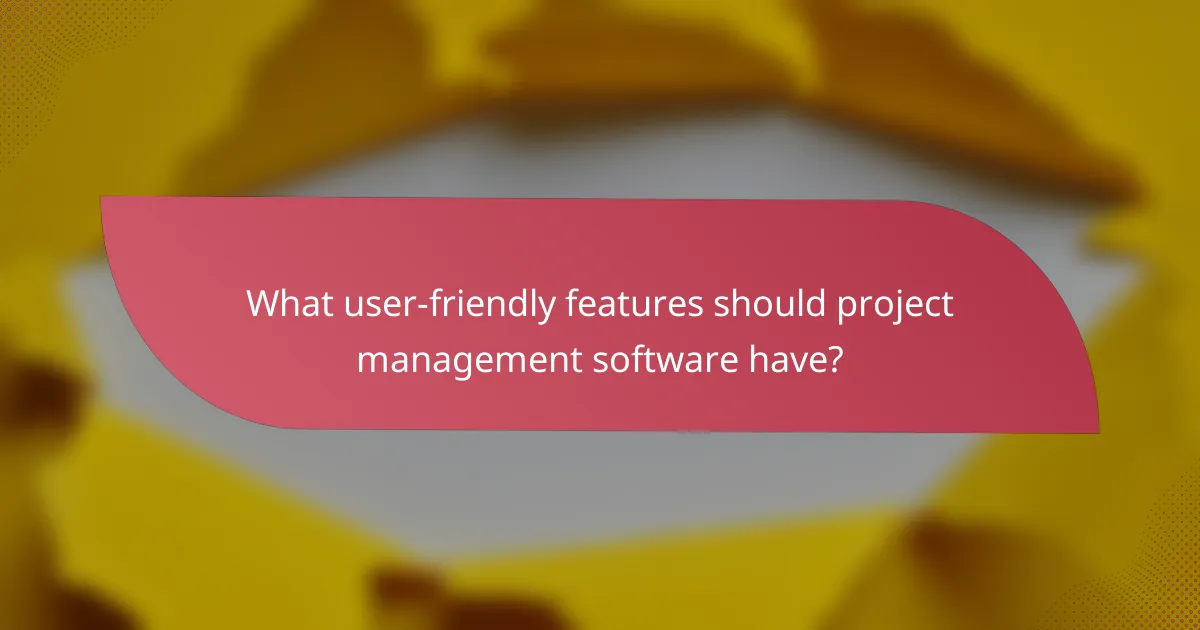
What user-friendly features should project management software have?
User-friendly project management software should include features that enhance usability, facilitate collaboration, and streamline workflows. Key elements to consider are an intuitive interface, effective collaboration tools, task automation capabilities, and mobile accessibility.
Intuitive interface
An intuitive interface is crucial for ensuring that users can navigate the software easily without extensive training. Look for clean layouts, clear icons, and logical workflows that allow team members to find what they need quickly.
Consider software that offers customizable dashboards, enabling users to prioritize tasks and view relevant information at a glance. This adaptability can significantly enhance productivity and user satisfaction.
Collaboration tools
Collaboration tools are essential for teams to communicate effectively and stay aligned on project goals. Features such as real-time chat, file sharing, and comment threads can facilitate seamless interaction among team members.
Additionally, integration with popular communication platforms like Slack or Microsoft Teams can further enhance collaboration. Ensure that the software supports notifications and updates to keep everyone informed about project changes.
Task automation
Task automation helps reduce manual effort and minimize errors in project management. Look for software that allows users to automate repetitive tasks, such as sending reminders or updating statuses based on specific triggers.
For example, automating task assignments based on team availability can streamline workflows and ensure that work is evenly distributed. This feature can save time and improve overall efficiency.
Mobile accessibility
Mobile accessibility is increasingly important as teams become more distributed and remote work becomes common. Project management software should offer mobile applications that allow users to access project information and collaborate on the go.
Check for features like offline access, push notifications, and mobile-friendly interfaces to ensure that team members can stay productive regardless of their location. This flexibility can significantly enhance team responsiveness and engagement.
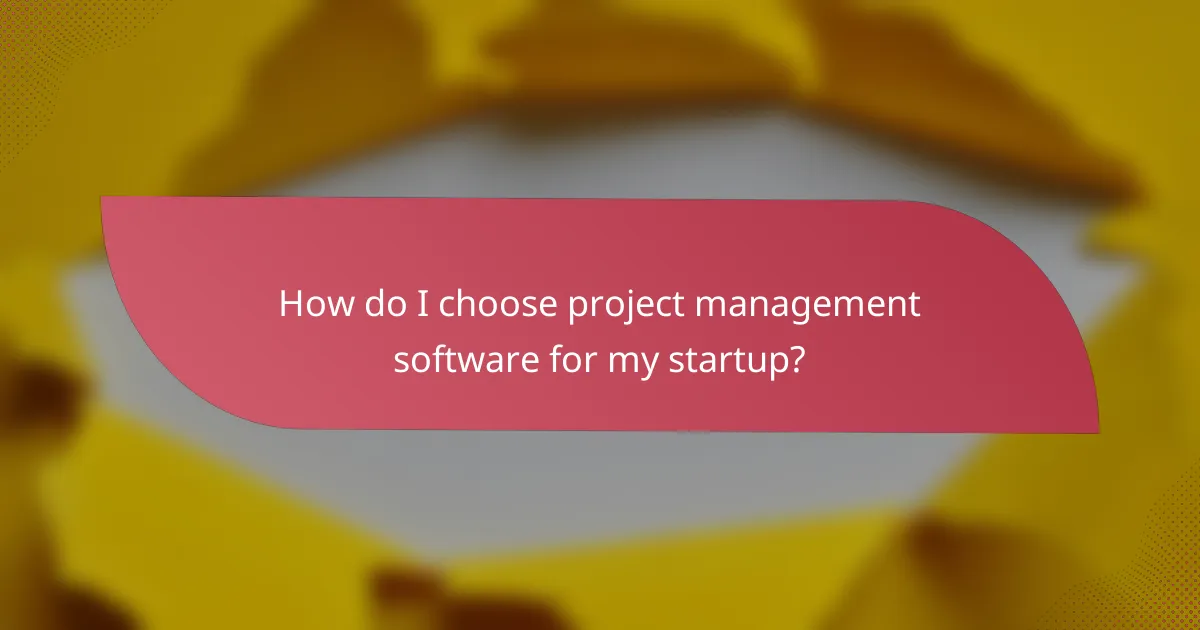
How do I choose project management software for my startup?
Choosing project management software for your startup involves evaluating your team’s needs, essential features, budget constraints, and integration capabilities. Focus on tools that enhance collaboration and streamline workflows while remaining within your financial limits.
Assess team size
Your team size significantly influences the choice of project management software. For smaller teams, simpler tools with basic features may suffice, while larger teams often require more robust solutions that support multiple users and complex projects.
Consider whether the software can scale with your team as it grows. Some platforms offer tiered pricing based on the number of users, which can be beneficial for startups planning to expand.
Identify key features
Identify the essential features that will support your startup’s workflow. Common features include task management, time tracking, collaboration tools, and reporting capabilities. Prioritize tools that align with your specific project needs.
For instance, if your team relies heavily on communication, look for software that integrates chat functions or video conferencing. Create a checklist of must-have features to streamline your decision-making process.
Consider budget
Budget is a critical factor when selecting project management software. Startups often operate with limited funds, so it’s important to find a solution that provides good value without sacrificing essential features.
Many software options offer free trials or tiered pricing plans. Evaluate these options to find a balance between cost and functionality, ensuring you can sustain the software long-term without exceeding your budget.
Evaluate integrations
Check how well the project management software integrates with other tools your startup uses. Seamless integration with applications like email, calendars, and file storage can enhance productivity and reduce friction in workflows.
Look for software that supports popular integrations or offers an API for custom solutions. This flexibility can save time and improve collaboration across different platforms, making it easier for your team to stay organized and efficient.

What are the pricing models for popular project management tools?
Popular project management tools typically offer a variety of pricing models, including subscription-based pricing and freemium models. Understanding these options can help startups choose the right tool that fits their budget and needs.
Subscription-based pricing
Subscription-based pricing is a common model where users pay a recurring fee, usually monthly or annually, for access to the software. This model often includes different tiers, allowing users to select a plan that aligns with their team size and feature requirements.
For example, basic plans might start at around $10 to $20 per user per month, while more advanced features could cost $50 or more per user per month. Startups should evaluate their growth potential and budget constraints when selecting a subscription plan.
When considering subscription-based pricing, be mindful of potential hidden costs, such as fees for additional users or premium features. Always check the terms of service for any cancellation policies or price increases.
Freemium models
Freemium models allow users to access a basic version of the project management tool at no cost, while offering paid upgrades for advanced features. This approach is particularly appealing for startups looking to test a tool before committing financially.
Typically, the free version includes essential features, but may limit the number of users or projects. Paid plans can range from $5 to $30 per user per month, depending on the features included. Startups should consider whether the free version meets their needs or if the investment in a paid plan is justified.
While freemium models can be advantageous, startups should be cautious of becoming reliant on free tools that may lack support or scalability. Evaluate the long-term viability of the tool as your team grows and project complexity increases.
